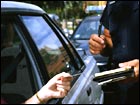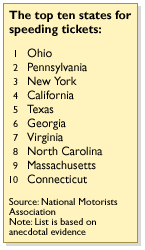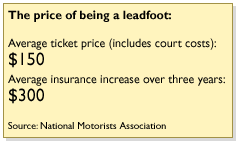
NEW YORK (CNN/Money) -
If you're one of the millions of drivers who is hitting the highways this Memorial Day weekend, watch out. Hiding behind that shady tree at the side of the road is likely a state trooper armed with a radar gun.
Before you know it, he'll be at your side uttering the four most hated words known to drivers: License and registration please. And you'll be out about $450 in fines and insurance costs. If you hire a lawyer? Ka-ching.
In Connecticut, for example, state police gave out 2,052 speeding tickets during last year's holiday weekend, nearly double the usual amount, according to Sgt. Paul Vance of the Connecticut State Police.
Connecticut has some of the most expensive tickets in the nation if you push the pedal above the posted speed limit of 55 mph, Vance said, with more than a little pride in his voice. (It's 65 mph in some places.) If you get stopped going 71 mph to 75 mph, the ticket will cost you $198. But hit 81 mph to 85 mph, and you'll pay a stiff $279. Go above 85 mph and you'll have a date with a judge.
"It's as if people have been in the bat cave all these months and they want to get out," Vance said. "We do not enjoy giving out speeding tickets. We look at people who have children in the car, families in the car, and we get satisfaction thinking hopefully we saved their lives."
From Ohio to Texas, states love to ticket speeders
There are no national statistics on how much U.S. drivers spend on traffic tickets each year, according to the National Motorists Association, a group that fought for the 1995 repeal of the 55 mph national speeding limit. But the figure is easily in the millions of dollars, according to Eric Skrum, communications director for the organization.

The states that issue the most speeding tickets nationally include Ohio, Pennsylvania and New York, he said. (See accompanying chart for the top 10.)
The average cost of a traffic ticket, including court fees, is roughly $150. You'll pay roughly $300 more in the next three years on higher insurance fees. If you fight the ticket, then add on the cost to hire a lawyer. And of course, you'll have to factor in lost time from work to plead your case.
"It's a big racket -- it's a way for states to make money," said Skrum. Many states make it easier to just pay the ticket than fight it. For example, some states allow you to pay the ticket on the spot with a credit card.
Indeed, for many towns, traffic tickets provide a substantial source of their revenue. The town of Waldo, Fla., for example, home of a notorious speeding trap on Route 301 between Tampa and Jacksonville, gets nearly 33.5 percent of its income from traffic tickets, according to Shir Lee Cox, a division manager for the American Automobile Association in Miami. The town of Lawtey, Fla., earns nearly 68.2 percent through traffic fines. As a result, AAA recommends its members use other routes.
Summersville, W.Va., is another danger zone for leadfoots. The town, with a population of 3,200, gave out 18,000 speeding tickets last year. Each year, it gets thousands of visitors to Summersville Lake, the largest in the state, as well as tractor-trailers and other traffic heading north or south on Route 19, which slices through town.

"I would rather be labeled a speed trap than a death trap," says Summersville Police Chief Jay Nowak.
In Texas, the situation got so out of hand that the state passed a law in 1995 limiting how much small towns could collect from speeding tickets, according to Luke Ball, an air traffic controller from Houston who is the state chapter coordinator of the motorists association. The law said towns with less than 5,000 people -- the biggest ticketers -- can only collect fines totaling 30 percent of their budgets. After that the cash goes to the state.
Some say safety has no price tag
While getting a speeding ticket may irritate you and lighten your wallet, it might be the least of your problems, say safety advocates. Higher speeds mean more accidents, more damage and more fatalities, said Tim Hurd, a spokesman for the National Traffic Safety Administration (NHTSA) in Washington.
| |
 Related Stories:
Related Stories:
| |
| | |
| | |
|
"We're talking about killing yourself, or someone else," Hurd said. "Or maybe worse than that, brain damage, or physical damage that puts you in a wheelchair for the rest of your life." According to a recent NHTSA study, Americans spent $40.3 billion on accidents involving excessive speed.

|

